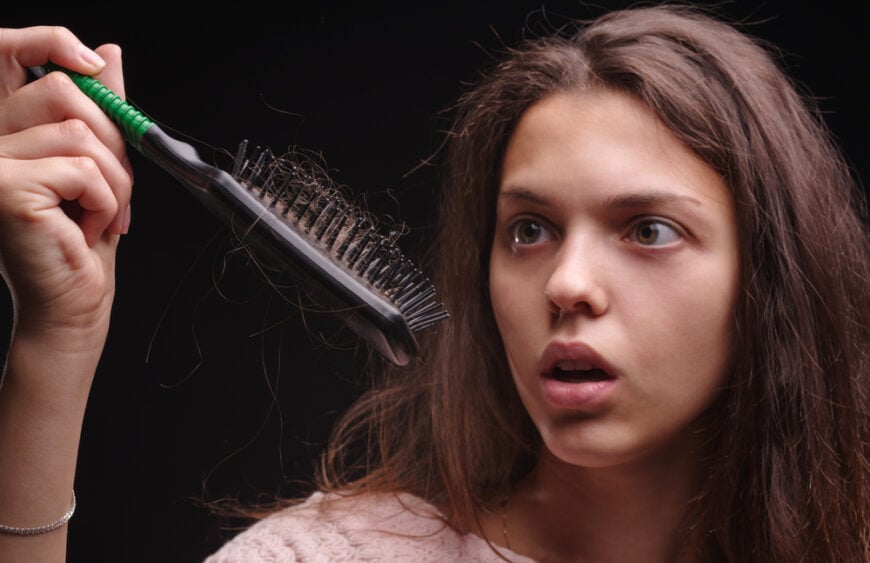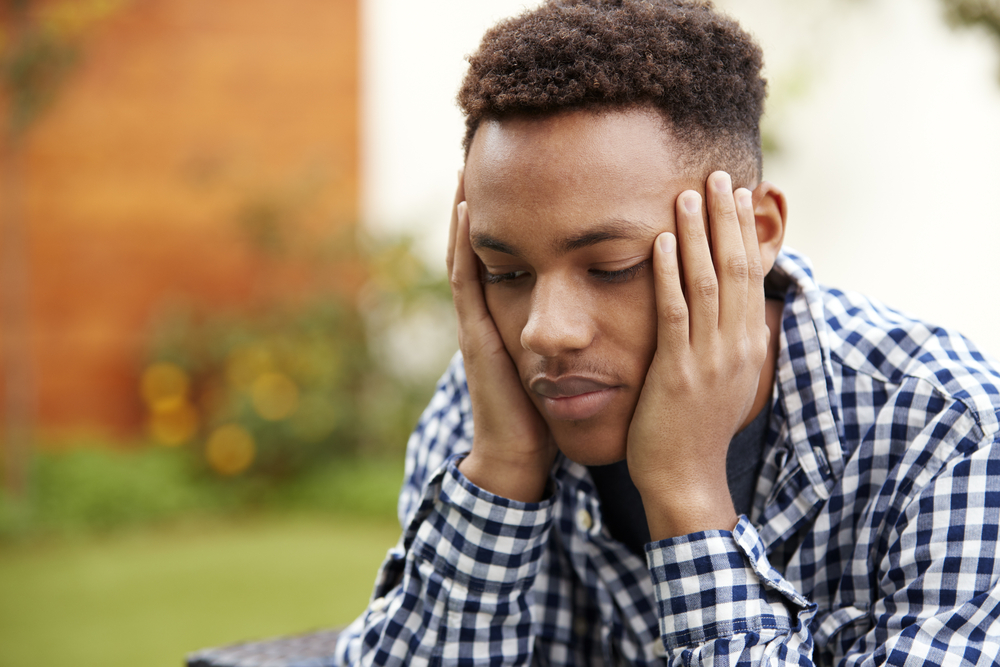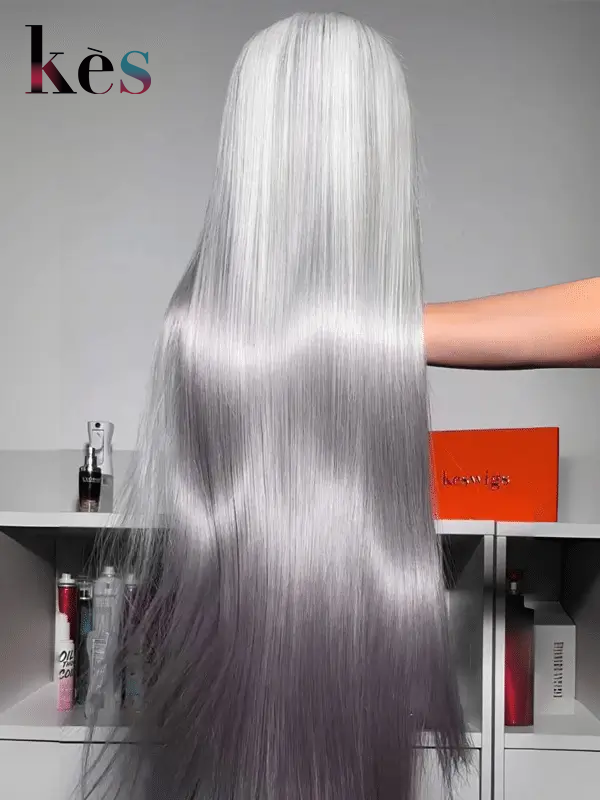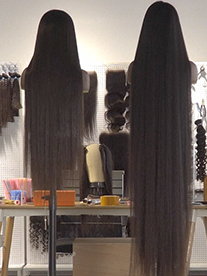
Extreme Stress and Hair Loss: Everything You Need To Know About Telogen Effluvium
We’re slowly emerging from the Covid-19 pandemic, but there is another pandemic that has been silently wreaking havoc through America for years: stress.
Healthline.com presents conclusions from studies showing that “Americans between 45 and 65 years old are experiencing more stress today than people their age did in the 1990s.” This is attributed to technological changes, relationship and family dynamics, and economic hardship.
Even though you may not realize it yet, extreme stress could be the reason for your hair loss. When stress triggers hair loss, the condition is known as telogen effluvium.
But what is telogen effluvium, and what are its signs and symptoms? What is the relationship between extreme stress and hair loss? How long after the stressful encounter does telogen effluvium start? How can I stop hair loss due to stress, and will my hair grow back?
We spent some time looking for answers to these questions and more. In this article, we present what we discovered.
What is Telogen Effluvium?
In a piece published by MedicalNewsToday.com, Jo Lewin, a registered nurse, defines telogen effluvium as “a form of temporary hair loss that usually happens after stress, a shock, or a traumatic event.”
The condition was first described in 1961 by the American dermatologist Albert Kligman in his research paper entitled “Pathologic Dynamics of Human Hair Loss: Telogen Effluvium.”
Signs and Symptoms of Telogen Effluvium
Naturally, a human being loses between 50 and 100 hairs a day. Therefore, small amounts of hair loss are considered normal.
Since you probably don’t have the time to count the number of hairs falling off your head daily, what other signs can indicate that you are losing more hair than normal?
According to the British Association of Dermatologists (BAD), “Usually there are no symptoms, but occasionally telogen effluvium can be accompanied by tenderness and altered sensations in the scalp, known as trichodynia.”
Even though the BAD notes that there are usually no symptoms, the association still says that you will notice when you are losing increased amounts of hair. For example, you may see more hair on your brush or in other parts of the house where you would usually not expect it.
The American Osteopathic College of Dermatology (AOCD) describes acute telogen effluvium using the phrase “hair coming out in handfuls.” This validates the view that you will undoubtedly notice when you lose more hair than expected.
How is Stress Related to Hair Loss?

Dr. Daniel Hall-Flavin describes the connection between stress and hair loss in his article published by MayoClinic.org. He identifies telogen effluvium as one type of hair loss associated with stress.
Dr. Hall-Flavin writes, “In telogen effluvium …, significant stress pushes large numbers of hair follicles into a resting phase. Within a few months, affected hairs might fall out suddenly when simply combing or washing your hair.”
The idea that stress may lead to hair loss was also confirmed by a recent study conducted by researchers affiliated with Harvard and other institutions. Ya-Chieh Hsu, one of the researchers, is quoted by the Harvard Gazette and suggests that stress hormones harm hair follicle stem cells.
The hair follicle anchors your hair to your skin. Therefore, it ensures that your hair remains attached, receiving the nutrients it needs to grow. Anything that negatively affects the hair follicle could damage your hair, leading to it falling out.
The American Academy of Dermatology Association lists examples of everyday stressors that trigger telogen effluvium:
- 1、Individuals who have lost 20 pounds or more.
- 2、Mothers that have just given birth.
- 3、Someone that has lost a job or a loved one.
- 4、People who recently had a high fever or are recovering from an illness.
- 5、Those who have undergone an operation.
Symptoms of Stress
To determine whether your hair loss is triggered by stress, it’s vital to know the symptoms of stress.
The Cleveland Clinic describes stress as a normal human reaction that occurs to everyone. The clinic adds that the body is designed to react to stress by producing physical and mental responses that help it deal with changes or challenges (stressors).
From this definition, we could deduce that extreme stress is when your stress can no longer be described as “a normal human reaction that occurs to everyone.” According to Yale Medicine, it’s “A consistent sense of feeling pressured and overwhelmed over a long period of time.”
Here are some of the symptoms of stress as listed by the Cleveland Clinic:
- 1、Aches and pains
- 2、Feeling as if your heart is beating faster
- 3、Feeling tired but finding it hard to sleep
- 4、Shaking, dizziness, or headaches
- 5、High blood pressure
- 6、Jaw clenching or muscle pressure
- 7、Digestive problems or stomach pain
- 8、Weakened immune system
- 9、Trouble having sex
The Effect of Covid-19
In her TheAtlantic.com article entitled “The Year America’s Hair Fell Out,” Amanda Mull says how she started noticing that she was losing a lot more hair than usual. She writes, “One day, after washing and drying my hair, I looked at my hairline in the mirror, and it was thin enough that I could make out the curvature of my scalp beneath it.”
Mull says that after extensively researching online, she started to believe that stress associated with the pandemic may be to blame and that her condition could be telogen effluvium.
Mull’s fears are certainly not bizarre; some scientific studies now support the fact that the Covid-19 pandemic triggered stress-induced hair loss. For example, a paper published in the Journal of Dermatology Research and Therapy says that since it started, Covid-19’s impact included psychological stress and anxiety.
The same paper concludes, “Psychological stress is a known etiology of a group of “stress-sensitive” skin conditions, including acute and chronic TE (telogen effluvium).
How Long After Stress Does Telogen Effluvium Start?
Even though the connection between stress and hair loss has been established, it’s vital to note that the hair doesn’t start falling out as soon as you get stressed.
According to the AOCD, you will start noticing increased hair shedding around two months after the “shock” event. The same organization says, “Shedding usually slowly decreases over 6 to 8 months once the cause for the hair loss is no longer present.”
A study published in the Journal of Clinical & Diagnostic Research reports a slightly longer period, noting that excessive hair shedding will start between three and four months following the triggering event.
How to Stop Hair Falling out Due to Stress

If extreme stress leads to hair loss, the solution is simple; just stop stressing, right? Well, this is easier said than done. The contradiction of this situation is that knowing that you are losing large chunks of hair triggers more stress that could result in you losing more hair.
Healthline.com advises that you can reduce further hair loss by managing your stress levels. You can start by:
- 1、Exercising: You don’t have to do anything hectic at the beginning, as you can start by taking a daily walk or joining a dance class.
- 2、Doing what you enjoy: Use your spare time to participate in activities you enjoy, like gardening or tutoring local youth that would otherwise not afford a tutor.
- 3、Writing: It has been shown to help reduce stress because it allows you to express yourself about the things that lead to your stress. When you read what you write, you may discover ways of dealing with the stressors.
- 4、Meditation: When you meditate and do other breathing exercises, you get an opportunity to focus on the present moment. Meditation could be combined with physical exercises like tai chi or yoga.
Keep Strong Connections
It’s important to seek social connections when you are feeling overwhelmed. The mental and wellness site Helpguide.org suggests, “Strong relationships with friends and family members can also bolster your mood, improve your outlook, and preserve your mental well-being.”
Eat Healthy
The medical information website WebMD.com advises that a healthy diet is crucial for your general health and your hair. A healthy diet includes vegetables and fruits, whole grains, and lean protein.
The same site adds that because stress-induced hair loss can be made worse by nutritional deficiencies, you could make up for this shortfall by taking supplements including Vitamin B12, Zinc, Vitamin D, and Ferritin.
Can Hair Lost Due To Stress Grow Back?
Let’s end this article with some good news: yes, hair lost due to stress can grow back.
In her MedicalNewsToday.com article, Lewin reports that hair lost due to telogen effluvium often grows back within three to six months after dealing with the cause of the stress. She adds that in some instances, the shedding rate may slow but doesn’t stop altogether.
Deal With the Cause
While several treatments are available for hair loss in general, the most effective way of determining the proper treatment for your condition is to deal with the cause. In this case, since we know that the cause is extreme stress, you would need to focus on that.
We list some common ways of dealing with stress above. However, if you have tried all those tips and failed, you may need to seek help where you can receive counseling support.
If you’re looking for a way to temporarily address the frustrations brought about by hair loss, using wigs can be a solution. If you choose high-quality wigs, like lace front wigs made with HD lace and virgin human hair, they can replicate a very natural hairline, making it nearly indistinguishable from real hair. Sometimes, even if some people don’t have issues with hair loss, if their own hair is thin, they may opt to use high-density wigs to achieve a lush and voluminous look.
At Keswigs, we’ve collaborated with renowned hairstylists and celebrities to create wigs of exceptional quality that meet the following standards: top-notch hair, HD lace that’s virtually invisible, and superb craftsmanship.



















































